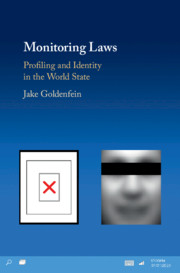Book contents
- Monitoring Laws
- Monitoring Laws
- Copyright page
- Contents
- Acknowledgements
- 1 Monitoring Laws
- 2 The Image and Institutional Identity
- 3 Images and Biometrics – Privacy and Stigmatisation
- 4 Dossiers, Behavioural Data, and Secret Speculation
- 5 Data Subject Rights and the Importance of Access
- 6 Automation, Actuarial Identity, and Law Enforcement Informatics
- 7 Algorithmic Accountability and the Statistical Legal Subject
- 8 From Photographic Image to Computer Vision
- 9 Person, Place, and Contest in the World State
- 10 Law and Legal Automation in the World State
- Index
10 - Law and Legal Automation in the World State
Published online by Cambridge University Press: 08 November 2019
- Monitoring Laws
- Monitoring Laws
- Copyright page
- Contents
- Acknowledgements
- 1 Monitoring Laws
- 2 The Image and Institutional Identity
- 3 Images and Biometrics – Privacy and Stigmatisation
- 4 Dossiers, Behavioural Data, and Secret Speculation
- 5 Data Subject Rights and the Importance of Access
- 6 Automation, Actuarial Identity, and Law Enforcement Informatics
- 7 Algorithmic Accountability and the Statistical Legal Subject
- 8 From Photographic Image to Computer Vision
- 9 Person, Place, and Contest in the World State
- 10 Law and Legal Automation in the World State
- Index
Summary
Our behaviour in informational environments is governed by new mechanisms of control. Technological environments do not simply enable or constrain specific behaviours, but are instead instrumented so that rational choices of agents are directed towards pre-specified goals. This type of engagement with the informational world is under-theorised in law. This chapter argues that we need to transcend the separation between physical and informational and work on building appropriate techno-legal mechanisms. It suggests we can think about these emerging environments, and the legalities that are implemented into them, as emerging jurisdictions that do not undermine law, but rather give it another form of expression.
Keywords
- Type
- Chapter
- Information
- Monitoring LawsProfiling and Identity in the World State, pp. 178 - 184Publisher: Cambridge University PressPrint publication year: 2019

